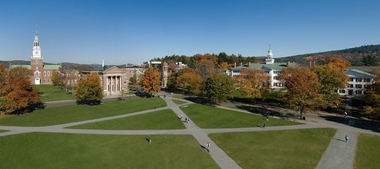Review panel praises Dartmouth campus culture reforms

CONCORD, N.H. (AP) — An outside review panel says Dartmouth College has successfully implemented its ambitious plan to overhaul its campus culture, and the focus now will shift to assessing its effectiveness.
It's been nearly two years since President Philip Hanlon announced a series of reforms aimed at addressing problems he said were "hijacking" the Ivy League school's promise: high-risk drinking, sexual assault and a lack of inclusion. The changes, dubbed the "Moving Dartmouth Forward" plan, include a ban on hard liquor, the development of a mandatory four-year sexual violence prevention curriculum and the creation of new residential communities.
All of the actions called for in the plan are underway, though some remain in the pilot phase, according to the second annual report submitted by a panel appointed to hold the school accountable. The group has received regular updates from administrators, reviewed relevant data and visited the Hanover campus twice in the last year to meet with students, faculty and staff.
"Our overwhelming impression was positive," said former Tufts University President Lawrence Bacow, the panel's chairman. "It's still very early in the process — change in university culture takes a long time. But everything we saw was encouraging."
At the time it launched its reforms, Dartmouth and many other schools were under intense scrutiny to address the intertwined problems of sexual assault and alcohol as students increasingly began speaking up and the federal government started cracking down. The school had received nationwide attention for allegations of fraternity hazing, and students had protested with a long list of demands for justice for minorities, the LGBT community and other students who felt marginalized.
In 2014, Dartmouth was among 55 colleges and universities under federal investigation over its handling of sexual harassment and violence. That number now exceeds 200 schools.
"Almost every college campus deals with exactly the same issues. But we know of very few campuses, if any, that are trying to approach it in as systematic a way as Dartmouth," Bacow said. "The jury's still out to see if it works, but we think Dartmouth as a community deserves credit for really approaching these issues in a systemic way and doing so publicly and visibly."
The panel found grudging acceptance of the hard alcohol ban, and undergraduate advisers and student leaders reported seeing fewer intoxicated freshman, particularly during the first few weeks of the fall semester. Alcohol-related incidents reported to college officials increased during the last school year, though the total included one party that counted as 25 incidents. The number of alcohol incidents requiring medical care decreased.
On the Dartmouth campus, students were divided over whether the changes were having a real impact, with some saying they were seeing less drinking of hard liquor and more programs aimed at preventing sexual assaults. But they also said it would take more than set of policies to change a hard partying culture that is so closely associated with Dartmouth — including an overhaul of the Greek system and more funding for mental health.
"So far, I haven't seen a big change," Hannah Margolis, a 19-year-old freshman from Nevada studying sociology, said. "But I think that is the nature of the school. I don't see students switching their views. I wish they would."
Andres Smith, a 22-year-old senior from Miami studying comparative literature, said the sexual assault curriculum had educated students about the types of things that "contribute to this really harmful behavior" while the drinking ban had meant students are drinking more beer.
"In some ways, the hard alcohol ban kind of sucks. I'm 22 and I want to drink what I want to drink," he said. "But in other ways if it's preventing sexual assaults and if it's helping people be healthier, then who I am to say that it's bad."
The review panel recommended the college expand its monitoring efforts to include data tracking the secondary effects of alcohol abuse.
"Students who are inebriated affect others," he said.
A task force composed of students and staff has designed the new sexual violence prevention program and submitted it for review. The college also has expanded its bystander initiative to train students to intervene in risky situations, and the review panel called it impressive in scale in impact compared to similar efforts at other schools.
In October 2015, the college launched a safety app that allows students to track friends and report safety concerns and emergencies. In its first year, there were 838 users, the panel said.
Of all the changes, Hanlon has said believes that the most transformational will be the new housing communities designed to give students more options for both social interaction and learning outside the classroom. Starting last fall, all incoming students were placed into one of six communities that include a cluster of residence halls that serve as a home base even for those who live elsewhere.
___
Associated Press writer Michael Casey contributed from Hanover, New Hampshire.
Copyright 2016 The Gayly - 11/17/2016 @ 8:27 a.m.





